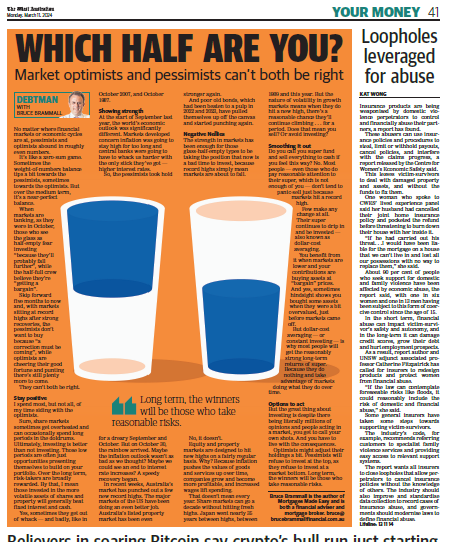
Bruce Brammall, The West Australian, 11 March 2024
No matter where financial markets or economic cycles are at, pessimists and optimists abound in roughly even numbers.
It’s like a zero-sum game. Sometimes the weight-of-numbers balance tips a bit towards the pessimists, sometimes the optimists. But over the medium term, it’s a near perfect balance.
When markets are tanking, as they were in October last year, those glass half-empty fear investing “because they’ll probably fall further”, while the half full crew believe they’re “getting a bargain”.
Skip forward five months to now and, with markets sitting at record highs after strong recoveries, the pessimists don’t want to buy because “a correction must be coming”, while optimists are cheering their good fortune and punting there’s still plenty more to come.
They can’t both be right.
Stay positive
I spend most, but not all, of my time siding with the optimists. Sure, share markets sometimes get overheated and can occasionally spend long periods in the doldrums.
Ultimately, investing is better than not investing. Those low periods are often just opportunities presenting themselves to build on your portfolio.
Over the long term, risk-takers are broadly rewarded. By that I mean that those invested in the more volatile assets of shares and property will generally beat fixed interest and cash.
Yes, sometimes they get out of whack. And badly, like October 2007. And October 1987.
Showing strength
At the start of September last year, the world’s economic outlook was significantly different. Markets developed concern inflation was going to stay high for too long and central banks were going to have to whack us harder with the only stick they’ve got, higher interest rates.
So, the pessimists took hold for a dreary September and October.
But on 30 October, the rainbow arrived. Maybe the inflation outlook wasn’t as bad as thought? Maybe we could see an end to interest rate increases? A speedy recovery began.
In recent weeks, Australia’s market has punched out a few new record highs. The major markets of the US have been doing an even better job.
Australia’s lListed property market has been even stronger again.
And poor old bonds, which had been beaten to a pulp in 2022 and 2023, have pulled themselves up off the canvas and started punching again.
Negative Nellies
The strength in markets has been enough for those glass half-empty types to be taking the position that now is a bad time to invest, because record highs simply mean markets are about to fall.
No, it doesn’t.
Equity and property markets are designed to hit new highs on a fairly regular basis. Why? Because inflation pushes the values of goods and services up, over time, companies grow and become more profitable and increased wages lift spending.
That doesn’t mean every year. Share markets can go a decade without hitting fresh highs. (Japan went nearly 35 years between highs, between 1989 and this year.)
But the nature of volatility in growth markets means that when they do hit a new high, there’s a reasonable chance that they’ll continue climbing … for a period.
Does that mean you sell? Or avoid investing?
Smoothing it out
Do you call you super fund and sell everything to cash if you feel this way? No. Most people, even those who do pay reasonable attention to their super – which is not enough of you – don’t tend to panic sell just because markets hit a record high.
Few make any change at all. Their super continues to drip in each month and be automatically invested. (Also known as dollar-cost averaging.)
You benefit from it when markets are lower and your contributions are buying assets at “bargain” prices. And yes, sometimes, hindsight shows you bought some assets when they were a bit overvalued, just before markets came off.
But dollar-cost averaging, or constant investing, is why most people will get the reasonably strong long-term returns of super. Because they do nothing and take advantage of markets doing what they do over time.
Options to act
But the great thing about investing is that, despite there being literally millions of opinions and people acting in a market, you get to call your own shots. And you have to live with the consequences.
Optimists might adjust their holdings a bit. Pessimists will refuse to invest at the top, as they refuse to invest at a market bottom.
Long term, the winners will be those who take reasonable risks.
Bruce Brammall is the author of Mortgages Made Easy and is both a financial adviser and mortgage broker. E: bruce@brucebrammallfinancial.com.au.
